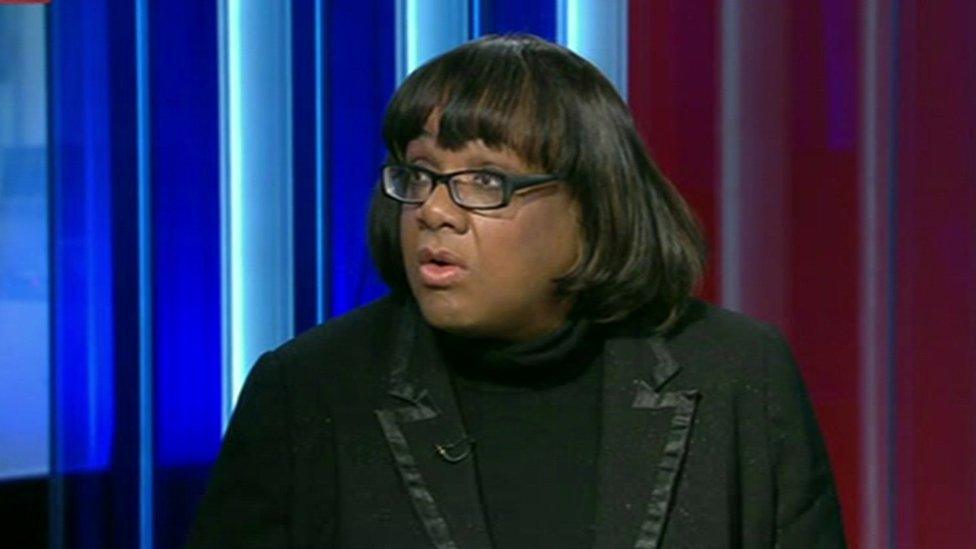British values oath would not combat radicalisation - Labour
- Published

Making civil servants and other holders of public office swear an oath to British values would not help combat radicalisation, the shadow home secretary has said.
Diane Abbott told Sky News it would not make "any verifiable difference".
, Communities Secretary Sajid Javid said he wanted public servants to set an example to newly arrived migrants.
Key values include democracy, equality and freedom of speech, he argued.
Mr Javid's intervention comes after a report by Dame Louise Casey in some UK communities.
He said he was "drawn" to her recommendation to bring in a pledge of allegiance, saying: "We can't expect new arrivals to embrace British values if those of us who are already here don't do so ourselves, and such an oath would go a long way to making that happen."
Former chancellor George Osborne hailed the idea as a "great initiative", and ex-culture secretary John Whittingdale also said he supported the oath.
But Ms Abbott said: "I have nothing against it in principle, but it will not make a difference to the problems of radicalisation, or integration."
She said her Hackney constituency had a "diverse population" of people, who live in the UK because "they value what this country has to offer and they respect its institutions, particularly people who originate from the Commonwealth".
'Gimmicky policies'
Teresa Pearce MP, shadow secretary for communities and local government, said better education should be the priority.
"We must not leap to implement gimmicky policies which are a superficial and cack-handed response to deep-rooted and long-standing problems," she said.
"Only by properly funding local government so it can enrich communities, as well as meet its statutory obligations, can we begin to tackle isolation, division and mistrust and bring communities together."
Communities Secretary Sajid Javid said he was "drawn" to the idea of an oath of allegiance
Mr Javid's proposals would mean every new recruit in the public sector, including councillors, school governors and civil servants, would be expected to commit to the oath, which may have to be read out loud before starting the role.
This could extend to those working in the NHS and the Βι¶ΉΤΌΕΔ.
Liberal Democrat home affairs spokesman Lord Brian Paddick said forcing public servants to swear such an oath would be "both superficial and divisive".
"We should be talking about the universal values that unite us, not using nationalistic terms that exclude people," he said.
"The government must focus on integrating those small pockets of people living in segregated communities. Instead, they are creating hostility towards all minority communities."
'Building blocks'
Mr Javid said he did not want to see a "government-approved, one-size-fits-all identity" where everyone "drinks tea, watches cricket and bobs up and down at the Last Night of the Proms".
But, he added, people would struggle to play a positive role in British life if they did not accept the "building blocks of our society".
The new oath could include "tolerating the views of others even if you disagree with them", "believing in freedom of speech, freedom of religion, freedom from abuse", "a belief in equality, democracy and the democratic process" and "respect for the law, even if you think the law is an ass," Mr Javid writes.
A government source acknowledged that the oath on its own would be insufficient to weed out extremism or promote integration.
Mr Javid will set out his full response to Dame Louise's report on social cohesion in the spring.
- Published5 December 2016